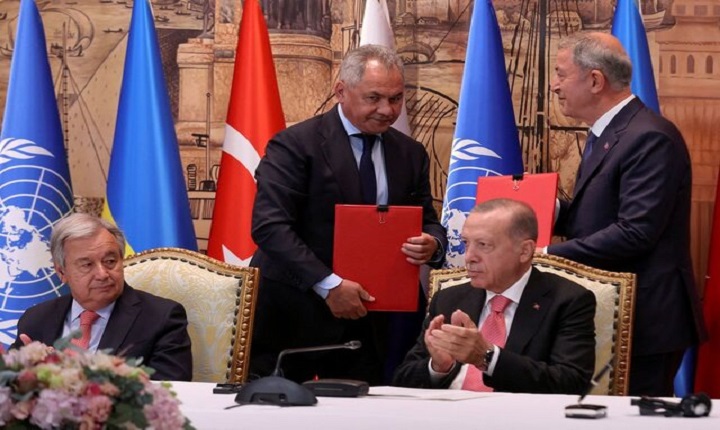Morteza Makki in an interview with the site of Strategic Council on Foreign Relations stated that one of the consequences of Russian invasion of Ukraine was to endanger the export of grains from Ukraine and Russia, and said:” the two countries supply at least 30% of the world’s grain and imposition of tough and severe sanctions by the West on Russia has sparked strong concern throughout the world on the food crisis and rising prices of grains”.
Having pointed out that Ukraine had stored about 20 million tons of grains in its ports’ warehouses at Black Sea which was ready to be exported, he explained:” Russia invaded Ukraine just at the same time, and in view of Ukraine sea blockade by Russia, the export of grains from the country was blocked”.
On the lobbying of Ukraine grain export Makki also said:” within the past several months since the Russian invasion of Ukraine, Antonio Guterres, the United Nations Secretary General has initiated counselling and political initiatives aimed at opening a corridor for the export of Ukrainian grains”.
The Expert of European issues commented on the role played by Turkey to sort out the problem and said:” In view of her geographical situation at Black Sea and Mediterranean Sea, and two straits of Bosporus and Dardanelles, Turkey played a special role in the UN Secretary General’s counselling. Amid this, Rejep Tayyib Erdogan also made special effort since the outbreak of Russian invasion of Ukraine for lobbying between Kiev and Moscow. In fact, Turkey made effort to avail herself of the opportunity and to take maximum political advantage of Ukraine Crisis”.
According to the expert, the issue to open a corridor for the export of Ukraine grains created a suitable opportunity for Ankara. Negotiations among Turkey, Russia, Ukraine and the UN within the past couple of months continued densely, and ultimately led the parties to achieve an agreement on July 21, 2022.
He emphasized that the agreement was considered as a political breakthrough for Turkey in the field of foreign policy and its important role to confront grain insecurity crisis in world countries especially African countries”.
Having stated that within the past several years, Turkey has made effort to establish a balanced relation among the U.S., NATO and Russia, Makki said:” the movements made by Turkey are in line with the same Pan- Ottomanism and Europeanism; Ankara wants to take maximum political and economic benefits from all three parties”.
He added:” Turkey can neither have a kind of relations full of tension with Russia nor it can ignore her close links with NATO, the European Union and the United States. From the other hand, Turkey wants to have close relations with Islamic countries as well, and thus plays the role of a regional power in the process of political developments among countries of the Middle East and North Africa”.
Having stressed on the issue that Turkey has made effort to play a balanced and impartial role vis-à-vis Russia and Ukraine on Ukrainian crisis, Makki said:” the output of the policy can be seen in July 21, 2022 Istanbul Agreement”.
He added:” according to the concluded agreement which will be valid for four months and is automatically extendable, Turkey has assumed the responsibility to sweep the mines from Ukraine ports, and the Russian government is also committed not to use the corridor already opened for the export of Ukraine grains to attack the country”.
According to Makki, the agreement was made under one condition from Russian side that the export of Russian grains and fertilizers will not be subjected to sanctions imposed by the West, and Russian ships can easily pass through the Black Sea, Bosporus and Dardanelles Straits without any concern about their grain consignments to be confiscated.
The expert underscored that prior to the agreement, in view of sanctions imposed upon Moscow by the West, one of the Russian ships which was carrying grain consignment was confiscated. Therefore, the agreement is also considered as a bid advantage for Russia, and it can continue to export one of its most important goods which will reduce to some extent the sanctions imposed on the country.
Having referred to the point that the Istanbul Agreement has ultimately removed to some extend the concerns about food crisis among the clients of Russian and Ukrainian grains, Makki said:” in the meantime, the agreement will prevent increasing price of grain in the world”.
Challenges Facing Modi in Indian General Election
Strategic Council Online – Interview: An expert on East Asian affairs said: Despite the chances of victory, the number of seats that Indian Prime Minister Narendra Modi will have in the next parliament is likely to be less because it seems that Muslims and other ethnic groups would vote for parties opposed to the ruling party.










0 Comments